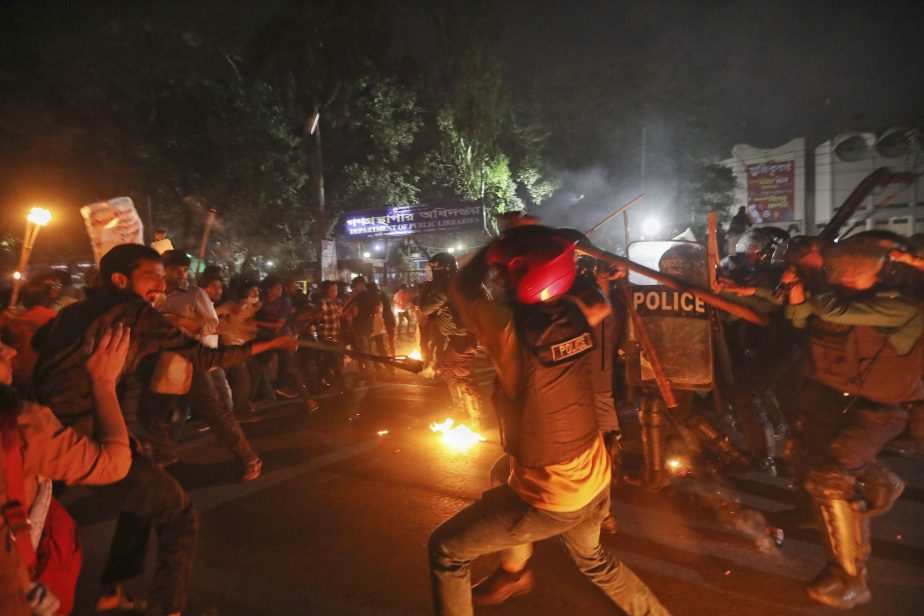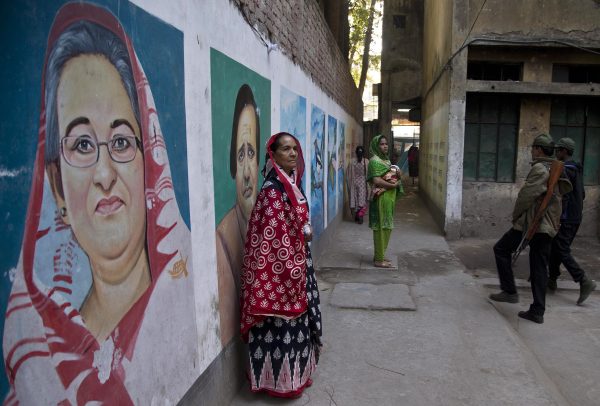With Bangladesh scheduled to vote in general elections in January 2024, concern is growing over how fair the polls will be, especially in the context of the massive irregularities that accompanied the 2014 and 2018 elections, and the erosion of Bangladesh’s democracy over the past decade. U.S. officials have expressed concern over the Awami League government’s rising intolerance of dissent. They have imposed sanctions and other restrictions on its officials for human rights violations. This has frayed Washington’s relations with Bangladesh, a country in which it has large strategic interests.
M. Humayun Kabir, a Bangladeshi career diplomat who served as Bangladesh’s ambassador to the United States, from 2007 to 2009 and is currently president of the Bangladesh Enterprise Institute (BEI), a leading think tank in Dhaka, said that Bangladeshi political parties must “agree to a common framework, which could ensure the holding of an inclusive, participatory and credible election in Bangladesh in 2024.” Othwerise, the outcome for Bangladesh could “be messy and costly,” he told The Diplomat’s South Asia Affairs Editor Sudha Ramachandran.
What underlies the recent fraying of the Bangladesh-U.S. relationship?
In recent months, the relationship between Bangladesh and the United States has gone through an expectation-frustration dynamic at the political level, with a visible mismatch of perception and policy centering on the issues of governance in Bangladesh. The fact of the matter is that over the last 15 years, while the U.S. had occasionally expressed its displeasure over sliding governance in Bangladesh, it tolerated the deviations to maintain the momentum of growing multidimensional and multilayered relations, keeping in mind the larger context. Particularly, it believed that Bangladesh’s support in fighting extremism was more valuable to its interest than allowing the governance issues to cast a shadow over the thriving bilateral relations.
Diplomat Brief
Weekly Newsletter
N
Get briefed on the story of the week, and developing stories to watch across the Asia-Pacific.
Get the Newsletter
However, the shift of focus in U.S. foreign policy toward democracy and human rights during the Biden administration has changed the dynamic, alongside its active focus on the Indo-Pacific region. The persistent decline in Bangladesh’s human rights record and multiplying threats to democratic governance, particularly after the seriously flawed elections in 2018, seem to have convinced the current U.S. administration to take an active interest in helping to streamline the democratic order in Bangladesh.
The imposition of sanctions on some Bangladeshi security officials for alleged violations of human rights in December 2021, leaving Bangladesh out of the democracy summits, and the announcement of a new visa policy toward Bangladesh in May 2023 seem to have widened the chasm in the political and diplomatic segment of the bilateral relationship. Other elements of the relationship, such as trade, remittance, security cooperation and people-to-people connectivity, however, seem to be largely unaffected by the ongoing tension.
But the U.S. is willing to overlook the grave violation of minority and democratic rights to build a strong partnership with India. Your comments?
The United States seems to be trying to play a balancing game between its professed set of values toward democracy and its evolving interests in the Indo-Pacific region. On the one hand, the U.S. recognizes the value of India as a possible strategic counterweight to China and in this context, the Biden administration and Congress accorded a high level of importance to Indian Prime Minister Narendra Modi’s recent visit to Washington, D.C. On the other hand, many congressional leaders, civil society, and media outlets raised serious questions about the steady decline in democratic space and human rights issues in India. The value of these institutions in the U.S. political landscape cannot be underestimated.
Advertisement
From our own experience, we have learned that the issue of human rights violations in Bangladesh had been initially brought to the public attention by the civil society think tanks in the U.S., which then attracted actions from Congress and the administration. It is therefore possible that we may see the strategic relationship between the U.S. and India growing in the coming months and years, even as issues related to governance and human rights remain high on the agenda.

Demonstrators clash with police as they protest the death in prison of a writer who was arrested on charges of violating the sweeping digital security, in Dhaka, Bangladesh, Feb. 26, 2021. AP Photo/Mahmud Hossain Opu
How important are the United States’ strategic interests in Bangladesh? Are they less important than its professed commitment to democracy?
In my view, both are important in the case of U.S.-Bangladesh relations. It is my impression that the U.S. sees its strategic interest in Bangladesh from a slightly flexible perspective. Therefore, we notice an effort to integrate the issues relating to values and interests in recent U.S. policy toward Bangladesh.
If one recalls, the U.S. was strongly supportive of the democratic transition in Bangladesh in 2008 and the Obama administration made Bangladesh a partner in several of its global priorities, although there was a lingering sense in Bangladesh that the U.S. had been looking at Bangladesh through the regional power prism. Nonetheless, a certain degree of unease was clearly caused by the subsequent slide in democratic practices in Bangladesh, particularly the way elections were held in 2014 and 2018, with huge negative consequences for the institutional integrity, governance, and accountability and transparency mechanisms as well as for human rights and media freedom.
At the same time, the U.S. appreciates the strategic value of Bangladesh for its location; its huge population size after China, India, Indonesia, and Pakistan in this region; the dynamism and creativity of its people; its economic potential as a fast-growing economy; and its reputation as a moderate Muslim democracy. With its growing focus on the Indo-Pacific region, the U.S. believes that Bangladesh with its borders with India and Myanmar and situated on the Bay of Bengal could play an important role in its positive engagement in the larger region. The presence of a huge Rohingya population in Bangladesh has also highlighted the value of keeping Bangladesh in the loop with the larger strategic agenda in the region.
Bangladesh has done a careful balancing act by building economic ties with several powers, including India, the U.S., Japan, and China. Will this strategy be impacted by the deteriorating Bangladesh-U.S. relations?
I tend to agree with you on this analysis. Any enduring complication in Bangladesh-U.S. relations could negatively affect the current balancing strategy of Bangladesh for advancing its vital national interests. Indeed, we are already seeing some indications in this direction. China and Russia have openly expressed their views on the recent U.S. interest in Bangladesh. Both China and Russia have essentially defined their position on Bangladesh from their perspective on the competition with the U.S. at the global level.
However, since the current political challenge is essentially governance-induced, Bangladesh may return to its balanced policy if it can resolve its ongoing political challenges by holding a free, fair, peaceful, participatory, and credible election, and then rebuild and strengthen its democratic institutions and practices. It is noteworthy that the balanced strategy pursued by Bangladesh vis-a-vis the major powers is not only a choice for itself; it is indeed a necessity, as demanded by its economic interests.
India appears to be less active than in the past in engaging various actors in Bangladesh in the run-up to the general elections. Is there a quiet shift in its longstanding position of support to the Awami League government?
Advertisement
The apparent less active role of India in engaging various actors in Bangladesh, as you have characterized it, may indicate the fact that India may have taken some lessons from its questionable involvement in the domestic political process in Bangladesh, particularly during the 2014 and 2018 elections, which is still widely resented in the country. It would be difficult to come to any conclusion at this time whether India has really shifted its position vis-a-vis the current ruling party, given the fact that it has benefited enormously from its relationship with Bangladesh during the last 15 years. However, it is possible that India is now carefully weighing its options in light of the unfolding political process.
Indian Foreign Minister S. Jaishankar’s recent comment on India’s role in the neighborhood is interesting. If India really adheres to the policy of keeping a distance from the domestic politics of its close neighbors, that would be helpful to develop a balanced relationship with India based on mutual respect, mutual interest, and mutual trust, and keeping the spirit of growing interdependence and the need to build up a partnership with a view to resolving many common issues, which challenge the region.
What are the chances of the Awami League government heeding Western pressure to hold elections under a caretaker government?
It is difficult to give any definitive answer to this question, as the stakes are very high on both sides of the aisle. The history of Bangladesh offers a mixed picture, filled with both a sense of optimism and a sense of pessimism. The optimism comes from the fact that despite the posturing, political parties in Bangladesh had to eventually come to an agreement in the past, and they could not also ignore the advice of the development partners. The pessimism comes from the fact that most of the past political changes were settled on the basis of street power, which was later formalized in the electoral outcome.
Nonetheless, the fact remains that the political parties in Bangladesh have to agree to a common framework, which could ensure the holding of an inclusive, participatory and credible election in Bangladesh in 2024. The alternative could unfortunately be messy and costly.
Many scholars have predicted two ominous outcomes. One could be the complete decimation of democratic institutions and practices, which would clearly betray the spirit of our Liberation War and the aspirations of the common people for ensuring their legitimate rights and role in governance. The other could be the possible deepening of the ongoing economic headwinds with the trust of development partners and other global stakeholders depleting further.
Clearly, Bangladesh can ill afford to lose the trust and confidence of the international community at this critical time. In light of this, it would be a better idea to listen to the voices and yearnings of the common people of Bangladesh for a free, fair, inclusive, participatory and credible election, even if we do not listen to the advice of our friends!

